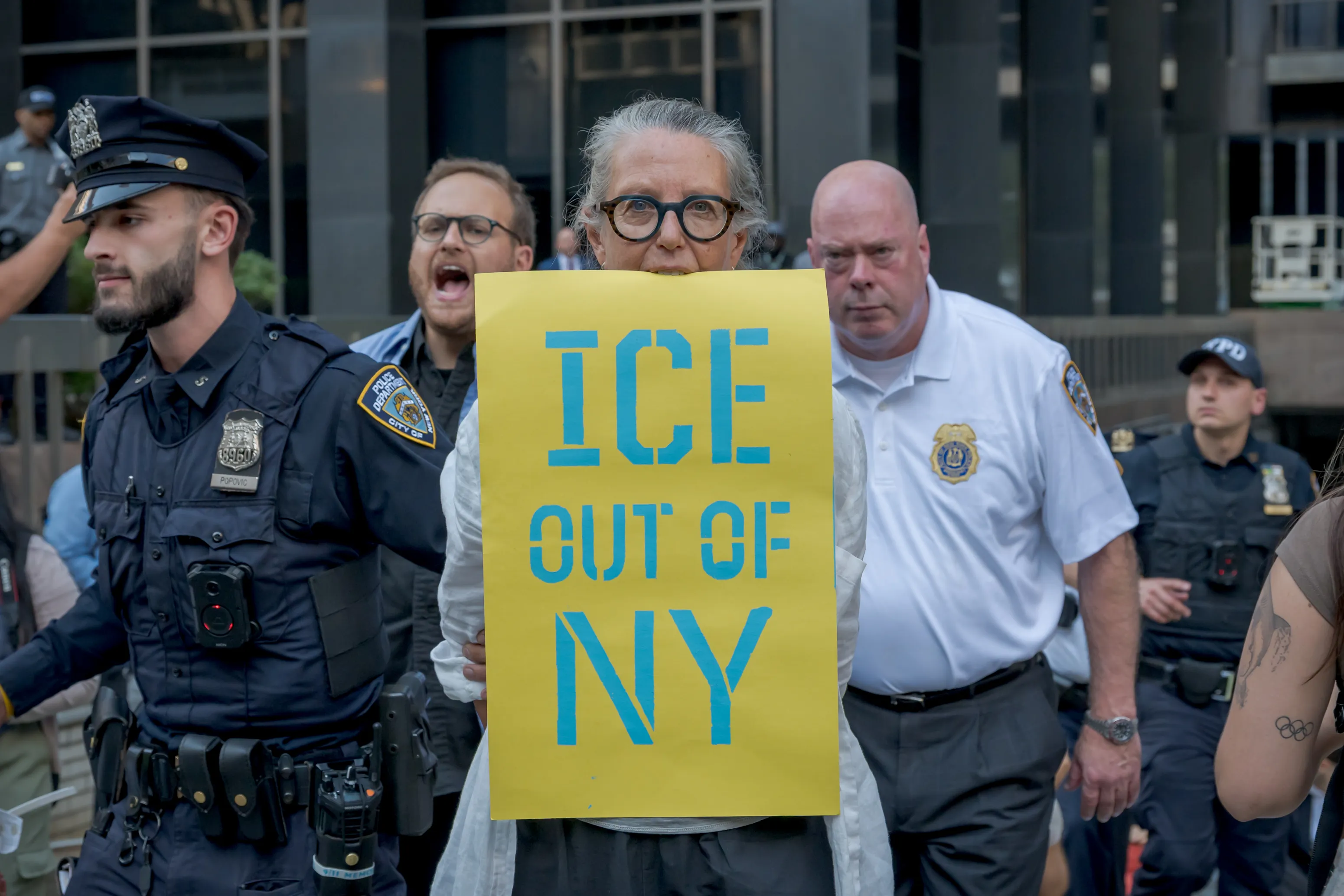State Lawmakers Are Getting Arrested at Detention Centers and Yelling at Masked ICE Agents. Good.
By Allegra Kirkland,Gaby Goldstein
Copyright talkingpointsmemo

This article is part of TPM Cafe, TPM’s home for opinion and news analysis.
This week, two moments revealed the front lines of America’s immigration fight. In New York, 11 state legislators were among more than a dozen elected officials arrested after demanding entry to overcrowded Immigration and Customs Enforcement detention cells at 26 Federal Plaza. In Illinois, a viral video showed State Senator Karina Villa racing down a suburban street, shouting in English and Spanish for families to stay inside as she confronted masked ICE agents.
These scenes capture something too often overlooked: while the federal government carries out a deeply unpopular agenda, state lawmakers are fighting back visibly and boldly. A hopeful story is unfolding as legislators defend communities with their voices and their bodies, uphold the rule of law, and embody a vision of government that protects rather than persecutes.The next step is to knit these efforts together so the energy in Illinois, New York, and beyond becomes a coordinated front.
This is the story of the moment: as federal power is abused, states are showing what democracy looks like in practice. Legislators are flexing their authority to protect families, confront masked agents, and make the fight visible. And they’re using these tools with ingenuity in every state, regardless of its color on a map.
Pursuing laws that flip the script
States are flexing fiscal power. In New York, lawmakers introduced the so-called Avelo Airlines bill, which would block public contracts and fuel tax exemptions for companies profiting from deportation flights. Maryland, New York and Wisconsin have introduced bills empowering state officials to withhold payments or slap liens on federal buildings if Washington defaults on funding. The message is blunt: if the federal government won’t honor its commitments, states shouldn’t bankroll its abuses.
But it’s not only about resistance. Pennsylvania legislators formed a Welcoming Caucus to advance bills creating an Office of New Pennsylvanians. Colorado and New York already have offices and run programs offering English classes, legal clinics, and hotlines for newcomers. These efforts send the signal that immigrants are valued neighbors and contributors.
Lawmakers are protecting people at work. Washington enacted SB 5104 to shield immigrant employees who file labor complaints. Last year, Washington followed in the footsteps of states like California by opening professional licensing to residents using taxpayer ID numbers instead of Social Security. Indiana and Oklahoma recently reduced barriers for foreign-trained medical professionals, filling critical shortages.
Privacy is another battleground. Washington’s 2019 Keep Washington Working Act restricts data sharing with ICE unless tied to an active criminal case. California and Colorado are advancing similar restrictions. These laws aim to keep school, health, and employment records from becoming tools of surveillance.
Then there is the rule of law. Delaware recently became the seventh state to ban 287(g) agreements that deputize local police as ICE agents, joining California, Connecticut, Illinois, Oregon, Washington, and Maryland. Bills in Pennsylvania, Massachusetts, Michigan, and New York would ban masked or unidentified law enforcement officers. Together, these laws flip the script, using state power not to target, but to protect.
Showing up and demanding answers
When ICE hides its operations behind closed doors, state legislators are fighting to pry them open. In Florida, lawmakers sued their governor after being denied entry to the Everglades Detention Facility, and subsequently gained access. In Washington, legislators passed HB 1470, mandating health inspections of private detention centers, over objections from GEO Group, the massive private prison contractor. Massachusetts legislators staged unofficial hearings to document raids and their toll. By using their oversight powers to walk into detention centers, convene hearings, and sue for access, state lawmakers are shining light where federal actors prefer darkness.
Dragging the fight into courtrooms
Some battles must be fought in court. Florida Rep. Anna Eskamani testified in litigation over the conditions inside the Everglades facility, adding her firsthand account to the record. Legislators elsewhere have signed on as amici, offered declarations, and supplied evidence that lawyers need to press their cases. Judges can compel accountability, and legislators are helping build the record to get there.
Making resistance visible
If authoritarianism thrives in the shadows, lawmakers are countering with cameras, microphones, and crowds. In New York, legislators stood outside the Metropolitan Detention Center for a press conference after ICE blocked access to detainees. Pennsylvania lawmakers staged a joint event to reintroduce the Office of New Pennsylvanians bill, flanked by immigrant families. In California, the Latino Legislative Caucus rallied with community partners to denounce ICE raids and back protective bills. Through speeches, press releases, social media livestreams, and joint statements across states, lawmakers are shifting the narrative from fear to solidarity.
These actions share a common purpose: to protect communities and uphold the rule of law. But too often they occur in silos, treated as isolated skirmishes rather than parts of a coordinated campaign. That’s a mistake. Conservatives already know that power accrues to those who exercise it. Just as the right has pooled resources for decades, progressive states and legislators must link arms now —- synchronizing bills, sharing data, holding joint hearings and press conferences. Coordination multiples power.
The lesson is clear. The judiciary will not reliably check authoritarian excess, and this administration is not deterred by public opinion. That leaves the states. Used together, their powers, including budgets, contracts, data, oversight, litigation, communications, can create not just defensive shields but affirmative models of governance.



